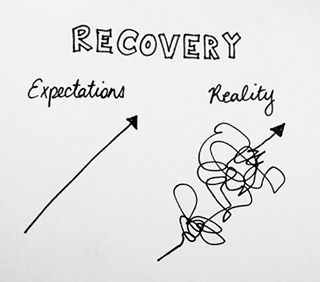Eating Disorder Recovery: One Size Does Not Fit All
I’m in recovery from an eating disorder.
When I say that, people often immediately think that means that I used to be extremely thin. That’s not the case at all. For me, having an eating disorder meant being at a normal weight most of the time, with cycles of restricting, purging, and emotional eating. I spent a lot of time as a teenager hating my body and fighting with food. I didn’t realize it at the time, but food and my behaviors around eating actually had nothing to do with weight loss: they were negative coping skills. They were a way to avoid underlying issues, and I relied on them heavily. I was using these symptoms as a way to soothe, comfort, numb, and feel in control.
My story is not uncommon, but it is unique to me.
Everyone’s experience is different. At times, I can relate to people who are living with an eating disorder, though I have learned never to assume that I know what it’s like to walk in their shoes. I can never understand exactly what someone is going through. There is no “one size fits all” eating disorder, or any mental illness, for that matter.

My experience has influenced how I approach crisis intervention because I know that every person is different and what they need varies from individual to individual. It’s impossible to have a script that will be useful to every single person who is struggling with an eating disorder. Every crisis is an opportunity for change, not a moment of weakness. It’s crucial to meet people where they’re at and work with them to develop an individualized plan. If we treat everyone the same based on a label, then we’re doing them a disservice.
After struggling with an eating disorder for years, I decided to willingly see a therapist for the first time.
Asking for help was one of the hardest things I have ever done, but it was also the best decision I ever made. Through therapy, support from friends and family, and learning to listen to my body, I realized that there were a lot of feelings that I was burying. I was doing everything in my power to avoid negative feelings, instead of processing and seeking support from people in my life. Now, I am in recovery, and my life is 10 times better because of it.
If you’re struggling with an eating disorder, or anything that is causing you distress, be patient with yourself.
Recovery is not linear. There are plenty of ups and downs throughout the process. Come up with a plan of coping skills to help you get through the days that are tough – cuddling with a pet, taking a bath, going for a walk, listening to music, painting, watching TV, really anything that you enjoy. It’s okay to ask for help. At times it can feel as though feeling better is impossible, but it IS possible. You can start by reaching out and talking about it to someone you feel comfortable talking to – a friend, family member, coworker, religious leader, therapist, doctor, or a trained Crisis Counselor by texting CONNECT to 741741. There are people out there who care about you and want to see you succeed, and it is these people who can act as your support system.
